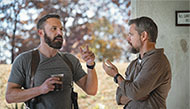Cool-Down Not Vital After Hard Workout
The importance of cooling down after exercise is enshrined in training lore. It’s in physiology textbooks, personal trainers often insist on it, fitness magazines tell you that you must do it - and some exercise equipment at gyms automatically includes it. You punch in the time you want to work out on the machine, and when your time is up, the machine automatically reduces the workload and continues for five minutes so you can cool down.
The problem, says Hirofumi Tanaka, an exercise physiologist at the University of Texas, Austin, is that there is no science behind the advice. The cool-down “is an understudied topic,” he said. “Everyone thinks it’s an established fact, so they don’t study it.”
It’s not even clear what a cool-down is supposed to be. Some say you just have to keep moving for a few minutes. Others say you have to spend 5 to 10 minutes doing the same exercise, only slowly. Still others say a cool-down should include stretching.
And it’s not clear what the cooldown is supposed to do. Some say it alleviates muscle soreness. Others say it prevents muscle tightness or relieves strain on the heart.
Exercise researchers say there is only one agreed-on fact about the possible risk of suddenly stopping intense exercise. When you exercise hard, the blood vessels in your legs are expanded to send more blood to your legs and feet. And your heart is pumping fast. If you suddenly stop, your heart slows down, your blood is pooled in your legs and feet, and you can feel dizzy, even pass out.
The best athletes are most vulnerable, said Dr. Paul Thompson, a cardiologist and marathon runner who is an exercise researcher at Hartford Hospital in Connecticut. “If you are well trained, your heart rate is slow already, and it slows down even faster with exercise,” he said.
That effect can also be deleterious for someone with heart disease, said Carl Foster, an exercise physiologist at the University of Wisconsin-La Crosse, because blood vessels leading to the heart are already narrowed, making it hard for blood to get in.
But does it matter for the ordinary, average athlete? “Probably not a great deal,” Dr. Thompson said. And, anyway, most people don’t just stand there, stock still, when their workout is over. They walk to the locker room or to their house or car, getting the cool-down benefit without officially “cooling down.”
The idea of the cool-down seems to have originated with a popular theory - now known to be wrong - that muscles become sore after exercise because they accumulate lactic acid. In fact, lactic acid is a fuel. It’s a normal part of exercise, and it has nothing to do with muscle soreness. But the lactic acid theory led to the notion that by slowly reducing the intensity of your workout you could give lactic acid a chance to dissipate.
In fact, Dr. Tanaka said, one study of cyclists concluded that because lactic acid is good, it is better not to cool down after intense exercise. Lactic acid was turned back into glycogen, a muscle fuel, when cyclists simply stopped. When they cooled down, it was wasted, used up to fuel their muscles.
As far as muscle soreness goes, cooling down doesn’t alleviate it, Dr. Tanaka said.
And muscle tightness?
“There are no data to support the idea that a cool-down helps,” Dr. Foster said.
Dr. Thompson says if he is doing a hard track workout he will jog for a short distance when he finishes to avoid dizziness.
As for Dr. Tanaka, he does not cool down at all. He sees no particular reason to do anything after exercising other than just stop.
스마터리빙
more [ 건강]
[ 건강]이제 혈관 건강도 챙기자!
[현대해운]우리 눈에 보이지 않기 때문에 혈관 건강을 챙기는 것은 결코 쉽지 않은데요. 여러분은 혈관 건강을 유지하기 위해 어떤 노력을 하시나요?
 [ 건강]
[ 건강]내 몸이 건강해지는 과일궁합
 [ 라이프]
[ 라이프]벌레야 물럿거라! 천연 해충제 만들기
 [ 건강]
[ 건강]혈압 낮추는데 좋은 식품
[현대해운]혈관 건강은 주로 노화가 진행되면서 지켜야 할 문제라고 인식되어 왔습니다. 최근 생활 패턴과 식생활의 변화로 혈관의 노화 진행이 빨라지고
사람·사람들
more
[한인단체 신년 인터뷰] KYCC 송정호 관장… “지역사회 위한 종합 서비스 강화”
LA 한인타운 대표 비영리단체 한인타운청소년회관(KYCC)의 송정호 관장은 “지금 우리가 하는 일은 커뮤니티 ‘니즈’가 있기 때문에 존재한다”…

[한인단체 신년 인터뷰] LA 평통 장병우 회장… “본연 역할로 한반도 평화 실질 기여”
민주평화통일자문회의 LA협의회(이하 LA 평통) 장병우 회장은 6일 본보와의 신년 인터뷰에서 붉은 말의 해인 병오년 새해를 맞아 신년 화두로 …
워싱턴주에 첫 한인 시의장
워싱턴주에서 첫 한인 시의회 의장이 탄생했다. 제이슨 문(한국명 문태원) 머킬티오 시의원이 새해 들어 시의장으로 선출되며 또 하나의 중책을 맡…
국회 방문단 대한인국민회 방문
윤후덕·이해식·김한규 의원과 조오섭 국회의장 비서실장 등 10여 명의 한국 국회방문단이 지난 5일 LA를 찾아 로즈데일 묘지와 국민회관 등 미…
[한인단체 신년 인터뷰] 명원식 파바월드 회장… …
“한인 차세대들이 바르게 자랄 수 있는 토대를 만드는 것이 제가 파바월드의 회장으로 존재하는 유일한 이유입니다”한인사회의 대표적 청소년 봉사 …
많이 본 기사
- 오바마케어 보조금 확대 3년 연장안 … 1
- 이민 단속 중 여성 피살에 항의시위 … 2
- 여객기 착륙하다 바퀴 8개 모두 ‘펑’
- 치매 위험 낮추고 뇌 보호 위해 해야 할 새해결심 8가지
- 尹구형 결심서 특검-변호인 신경전…재… 1
- UC 캠퍼스 한인 재학생 역대 최다
- 주말까지 강풍 몰아친다… 남가주 돌풍주의보
- [제11회 건강걷기대회@그리피스팍] “다함께 걸으며 건강·화합 챙기고 이웃돕기 동참”
- 한인사회도 ‘수퍼독감’ 비상… 타운 병원들 ‘북적’
- 재외국민 한국 정착 돕는다
- “뉴욕한인회 사태 배후세력 있다”
- 티넥 담배전문점서 강도행각 10대한인 체포
- 간병인 자격증 웍샵·시민권 시험준비 속성 코스
- VA 올드도미니언대 졸업생이었다
- 워싱턴 지역 ‘연방정부 일자리’ 7만2천여개 사라져
- “2세 아동도 무상교육”⋯ 맘다니 1호 무상정책 시동
- 트럼프 행정부, DC 교통단속 카메라 전면 금지 추진
- ‘비자 보증금’대상 38개국으로 확대
- 플러싱고교 성적조작 혐의로 조사 받는다
- “한인 이민현장 30년 담아”
- 오바마케어 보험료 납부 ‘대혼란’
- 뉴욕한인음악인들 하와이 신년음악회 무대에
- “인간과 자연, 상생 길(道) 찾아야”
- 뉴욕 원로 작가 임충섭 개인전
- 연방하원, 오바마케어 보조확대 3년 연장안 통과
- 조윤희 9세 딸, 갈수록 ‘父 이동건 얼굴+키’ 붕어빵..숨길 수 없는 DNA
- 미주 CBS TV 대표 이종용 목사 선임
- 또 총기난사… 솔트레익시티서 2명 사망·6명 부상
- “10년 전 산 빌라 재개발, 집값 5배↑”..장민호가 놀란 김양 재테크 능력
- ‘故 안성기 아들’ 안다빈 씨, 父 생전 편지 낭독..영결식 눈물바다
- 인터뷰 도중 정상통화하고 레이저빔 쏘고…트럼프, NYT에 쇼맨십
- 트럼프, 작년 韓구금사태에 “단속 마음에 안들어…전문가 허용해야”
- 머홈스 없는 NFL 플레이오프… 수퍼보울 향한 경쟁 ‘본격 시작’
- 워크숍 통해 ‘차세대 리더’ 역량 강화
- 젠슨 황 선전포고… ‘알파마요 연합군’ 확장 지각 변동
- CES에서 공개된 독특한 외형의 로보택시 ‘죽스’
- 덴마크·그린란드, 美 ‘그린란드 회담’ 수락에 “환영”
- ‘캄보디아 스캠범죄 두목’ 천즈, 체포돼 중국 송환
- 신라면 40주년… ‘신라면 골드’ 출시
- 칙칙폭폭 ‘미니’ 기차 타고 마테호른, 콜로세움 한 바퀴
- ‘액자형 TV’ 시장 진출… 아마존, CES서 첫 공개
- [업계] 페창가 리조트&카지노… ‘국민 트로트 여제’ 송가인 남가주 단독 공연
- [삶과 생각] 겸손
- ICE에 부당하게 구금됐던 MD 여성, 한 달만에 석방
- “대한민국 대표 ‘포스터보이’ “ 英… 1
- [신년 기획 - 연초 시작하면 좋은 투자·저축계획] “401(k)(직장퇴직연금)·IRA(개인은퇴계좌) 재점검… 꼭 가입하고 분담금 늘려야”
- 2026년 고용주가 유념해야 할 리스크와 대책
- 북VA 부자, NBC 게임쇼서 상금 160만불 거머쥐어
- 매입? 실제 침공?… ‘트럼프의 그린란드 장악’ 3가지 시나리오
- 뉴욕서도 ‘ ICE 총격 살해’ 항의 시위
1/5지식톡

-
 미 육군 사관학교 West Poin…
0
미 육군 사관학교 West Poin…
0https://youtu.be/SxD8cEhNV6Q연락처:wpkapca@gmail.comJohn Choi: 714-716-6414West Point 합격증을 받으셨나요?미 육군사관학교 West Point 학부모 모…
-
 ☝️해외에서도 가능한 한국어 선생님…
0
☝️해외에서도 가능한 한국어 선생님…
0이 영상 하나면 충분합니다!♥️상담신청문의♥️☝️ 문의 폭주로 '선착순 상담'만 진행합니다.☎️ : 02-6213-9094✨카카오톡ID : @GOODEDU77 (@골뱅이 꼭 붙여주셔야합니다…
-
 테슬라 자동차 시트커버 장착
0
테슬라 자동차 시트커버 장착
0테슬라 시트커버, 사놓고 아직 못 씌우셨죠?장착이 생각보다 쉽지 않습니다.20년 경력 전문가에게 맡기세요 — 깔끔하고 딱 맞게 장착해드립니다!장착비용:앞좌석: $40뒷좌석: $60앞·뒷좌석 …
-
 식당용 부탄가스
0
식당용 부탄가스
0식당용 부탄가스 홀세일 합니다 로스앤젤레스 다운타운 픽업 가능 안녕 하세요?강아지 & 고양이 모든 애완동물 / 반려동물 식품 & 모든 애완동물/반려동물 관련 제품들 전문적으로 홀세일/취급하는 회사 입니다 100% …
-
 ACSL 국제 컴퓨터 과학 대회, …
0
ACSL 국제 컴퓨터 과학 대회, …
0웹사이트 : www.eduspot.co.kr 카카오톡 상담하기 : https://pf.kakao.com/_BEQWxb블로그 : https://blog.naver.com/eduspotmain안녕하세요, 에듀스팟입니다…
케이타운 1번가
오피니언

무분별 이민 단속이 불러온 비극

무면허 건축업자 피해 근절돼야
 메건 매카들 워싱턴포스트 칼럼니스트
메건 매카들 워싱턴포스트 칼럼니스트 [메건 매카들 칼럼] 마두로는 체포했지만… 베네수엘라 석유 생산 회복은?
 김미선 서북미문인협회 회장시인
김미선 서북미문인협회 회장시인 [한국춘추] 새해, 북방의 한국인을 생각하며
 김인자 시인·수필가
김인자 시인·수필가 [금요단상] 2026년을 맞이하며
 최형욱 / 서울경제 논설위원
최형욱 / 서울경제 논설위원 [만화경] 선거용 볼모 된 새만금
 최호근 / 고려대 사학과 교수
최호근 / 고려대 사학과 교수 [역사속 하루] 1938년 1월 3일 소아마비극복재단 출범
 이상희 UC 리버사이드 교수 인류학
이상희 UC 리버사이드 교수 인류학 오렌지 상자와 함께하는 2026년
 오세정 서울대 물리천문학부 명예교수·전 총장
오세정 서울대 물리천문학부 명예교수·전 총장 [오세정 칼럼] 병오년 새해, 한국의 과제
1/3지사별 뉴스

“2세 아동도 무상교육”⋯ 맘다니 1호 무상정책 시동
뉴욕시가 앞으로 모든 2세 아동을 대상으로 무상 보육을 제공키로 했다.부자 증세, 임대료 동결, 무상 보육, 무상 버스 등의 공약으로 돌풍을 …
연방하원, 오바마케어 보조확대 3년 연장안 통과

워싱턴 지역 ‘연방정부 일자리’ 7만2천여개 사라져
지난해 워싱턴 지역에서 총 7만2천개 이상의 연방정부 관련 일자리가 없어진 것으로 나타났다.연방 노동통계국(BLS)이 7일 발표한 실업률 자료…
오바마케어 보험료 납부 ‘대혼란’

포틀랜드서 또 이민당국 요원이 총격…2명 병원 이송
연방 이민 당국 요원이 가한 총격으로 사람이 다치는 사건이 또다시 발생했다.8일 AP통신과 ABC 방송 등에 따르면 오리건주 포틀랜드 경찰은 …
살림으로 뿌리내리다- 테이크루트 안미정 대표의 요리 이야기 (9)

오늘 하루 이 창 열지 않음 닫기 



















































.png)


댓글 안에 당신의 성숙함도 담아 주세요.
'오늘의 한마디'는 기사에 대하여 자신의 생각을 말하고 남의 생각을 들으며 서로 다양한 의견을 나누는 공간입니다. 그러나 간혹 불건전한 내용을 올리시는 분들이 계셔서 건전한 인터넷문화 정착을 위해 아래와 같은 운영원칙을 적용합니다.
자체 모니터링을 통해 아래에 해당하는 내용이 포함된 댓글이 발견되면 예고없이 삭제 조치를 하겠습니다.
불건전한 댓글을 올리거나, 이름에 비속어 및 상대방의 불쾌감을 주는 단어를 사용, 유명인 또는 특정 일반인을 사칭하는 경우 이용에 대한 차단 제재를 받을 수 있습니다. 차단될 경우, 일주일간 댓글을 달수 없게 됩니다.
명예훼손, 개인정보 유출, 욕설 등 법률에 위반되는 댓글은 관계 법령에 의거 민형사상 처벌을 받을 수 있으니 이용에 주의를 부탁드립니다.
Close
x